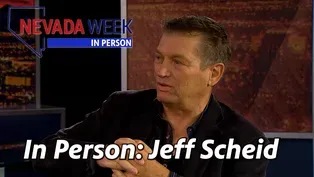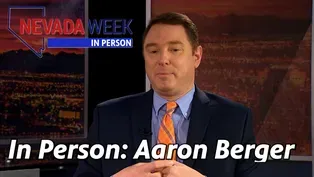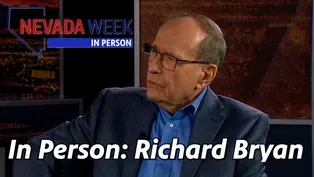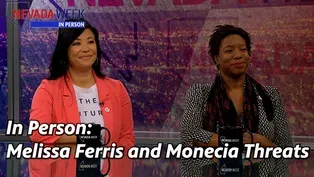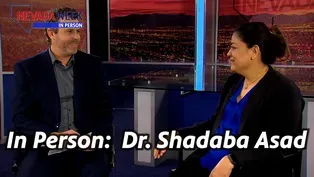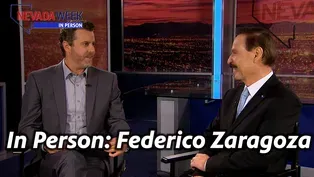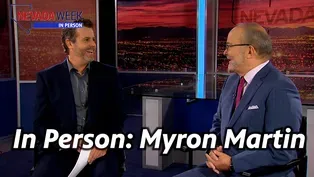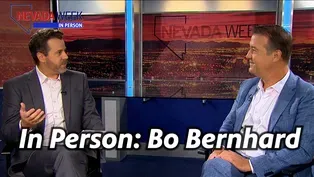
Nevada Week In Person | Brian ‘Paco’ Alvarez
Season 1 Episode 5 | 14mVideo has Closed Captions
A personal interview with arts and culture curator Brian ‘Paco’ Alvarez.
Brian ‘Paco’ Alvarez has done just about everything in Las Vegas’ arts and culture scene. Now he’s out on his own with a new venture called Psionic Art Works.
Problems with Closed Captions? Closed Captioning Feedback
Problems with Closed Captions? Closed Captioning Feedback
Nevada Week In Person is a local public television program presented by Vegas PBS

Nevada Week In Person | Brian ‘Paco’ Alvarez
Season 1 Episode 5 | 14mVideo has Closed Captions
Brian ‘Paco’ Alvarez has done just about everything in Las Vegas’ arts and culture scene. Now he’s out on his own with a new venture called Psionic Art Works.
Problems with Closed Captions? Closed Captioning Feedback
How to Watch Nevada Week In Person
Nevada Week In Person is available to stream on pbs.org and the free PBS App, available on iPhone, Apple TV, Android TV, Android smartphones, Amazon Fire TV, Amazon Fire Tablet, Roku, Samsung Smart TV, and Vizio.
Providing Support for PBS.org
Learn Moreabout PBS online sponsorshipMore from This Collection
Nevada Week In Person | Jeff Scheid
Video has Closed Captions
A one-on-one interview with longtime Southern Nevada photojournalist Jeff Scheid. (14m)
Nevada Week In Person | Aaron Berger
Video has Closed Captions
We talk with the executive director of the Neon Museum, Aaron Berger. (13m 59s)
Nevada Week In Person | Richard Bryan
Video has Closed Captions
Retired Nevada Senator Richard Bryan talks about his life in service of the state. (14m)
Nevada Week In Person | Monecia Threats and Melissa Ferris
Video has Closed Captions
Monecia Threats and Melissa Ferris talk sports in Las Vegas. (14m)
Nevada Week In Person | Dr. Shadaba Asad
Video has Closed Captions
Infectious disease expert Dr. Shadaba Asad on the coronavirus pandemic. (14m)
Nevada Week In Person | Federico Zaragoza
Video has Closed Captions
An in-depth and personal conversation with CSN President Federico Zaragoza. (14m)
Nevada Week In Person | Myron Martin
Video has Closed Captions
An in-depth personal discussion with Smith Center CEO Myron Martin. (14m)
Nevada Week In Person | Bo Bernhard
Video has Closed Captions
An in-depth conversation with Bo Bernhard from UNLV about his work with the university. (14m)
Providing Support for PBS.org
Learn Moreabout PBS online sponsorship♪♪♪ Support for Nevada Week In Person is provided by Senator William H. Hernstadt and additional supporting sponsors.
(Kipp Ortenburger) Las Vegas oftentimes is seen by many as a cultural wasteland.
Many of us have come to Las Vegas from other places, and some argue this has only diluted what cultural heritage we have, while others argue our unique diversity provides a watershed from which an equally unique and diverse culture can spring.
Well, at the forefront of this discussion in every way imaginable is Las Vegas native Brian "Paco" Alvarez.
Paco has been called by Las Vegas Weekly, "an omnipresent fixture in the local landscape, "whether it's arts, history or Downtown."
He's a cultural historian, entrepreneur and art curator.
He has worked at the Liberace Museum, the Neon Museum, AREA15's Museum Fiasco and Zappos.
He's now off on his own with Psionic Artworks.
Paco, thank you so much for joining us.
-Thank you for having me.
That was a long introduction, you know.
-It's a long list, and we left a lot of things off that list too.
I mean, we could talk about some of your board memberships, but also other jobs you've had in town too.
But that's why we wanted to have you on, because you do, you provide such interesting perspective.
A lot of your focus is on kind of the cultural curation of what we are as Las Vegans, and I want to start there with something I said right away.
I mean, recent growth and diversification, right, we have diversified a lot.
We've grown exponentially.
Good or bad thing for our cultural vision here in Las Vegas?
(Brian "Paco" Alvarez) It's good because the bigger the population, especially from different communities, will force the old guard here in this community to begin thinking more broadly about the important things of making Las Vegas a very livable place.
Now, in the arts there's-- we're a very small group of people, you know, yelling constantly.
But with the new influx of people that have been coming in, you know, sports-- 20 years ago, we would have never even-- we'd laugh.
We would laugh at having the Raiders here.
We're never going to get-- my father would always say we're never going to have professional sports here.
And now that has changed in big part because of a population that has moved into the city that expects a city our size to have those kind of amenities, and the last part of that is the arts.
So they're going to demand, and they're already demanding, more cultural access.
-You mentioned sports.
That might be surprising that we associate sports with culture and culture of Las Vegas, but clearly we should be talking about sports as a big part of our cultural identity.
-Without a doubt.
The first baseball team that Las Vegas had was in 1906, and people seem to forget our history.
Las Vegas was not founded by Bugsy Siegel in 1945.
He actually died in 1946.
You know, Las Vegas started in 1905, founded, and there was a lot-- there's always been culture.
I mean, you look at the Mesquite Club, for instance, which is a women's service organization started in 1911.
They started the first library.
They started the first art guild.
This is in the teens when Las Vegas had a population of 500 people.
-You said in the past-- I went through and found some old interviews of you so bear with me, it's from several years ago-- but you did say in reference to population growth, "Population growth has displaced "the local population and its culture, "in a sense watered it down a little bit," and we're talking about original kind of native culture here.
Talk about that.
Do you feel that way still, now that we've grown so much?
That interview, by the way, for reference I think was about 10 years ago.
-Okay.
Yes, I think it has changed, and my opinion has changed slightly.
I think the key is making sure that we stay who we are as a city.
You know, being able to wake up at two in the morning and grab a pint of ice cream at 7-Eleven is part of our culture.
Being able to go to a bar or a restaurant late at night is part of our culture.
We're a 24-hour town, and we should never change that.
You know, people will adjust quickly when they move into the city and realize that we are a community.
We're a very libertarian city, we're very libertarian state, low taxes.
You know, we have a very different culture from other places.
I think the danger is with a lot of the population that's moving in, don't come from New York or Chicago or Los Angeles saying oh, we're bringing art and culture to Las Vegas because if you say that, you're going to offend the Paiute people that have been here for over a thousand years.
There's been culture in Southern Nevada for 10,000 years.
It has been the center part of the migration of people from Asia to South America, and we're right smack in the middle of it.
There are, you know, countless caves, petroglyphs all throughout the area that speak to a much broader cultural connection that we've had for millennia.
-Let's talk about you too.
You are a native Las Vegan, born and raised here, and again as we have more people from the outside come in-- I'm one of them-- you are displaced more.
You mentioned some of those cultural attributes right there, you know, going to 7-Eleven.
It's a cultural attribute here, a 24-hour-access town.
I mean, how do you feel about that?
Do you feel that there still is a solid, native Las Vegan culture here in the city?
-There is; it's small and growing.
Keep in mind that all these people that have moved in from other communities are having babies, so now there's this huge growing population of very young people saying hey look, I'm from Vegas.
You know, when I travel abroad, I tell people, people ask where are you from?
I don't tell them I'm from the United States.
I just tell them I'm from Las Vegas, and their eyes, oh, my gosh, do you know Wayne Newton?
Everybody knows Wayne Newton, you know.
So people really have a vision of Vegas globally that is of entertainment and, you know, casinos and excess and all that, and that is very unique to Las Vegas.
-It's unique and it reminds me of-- and you mentioned Wayne Newton.
I mean, you hear this a lot, especially the longer that you live here, that it's a big and growing city but it's still extremely small to the point where you even sometimes have access to some of our big stars and marquee performers like that that you just see around town, or you'll go to an event and you'll see them there.
Do you think that'll always be part of Las Vegas?
-I hope so.
I think, you know, culture evolves.
I mean, culture is not a static thing.
People will quickly realize, you know, that we do things a certain way in this community, in this state, that is not the norm in other places.
You know, I said earlier when someone's driving in from Utah back in the '50s, they would say don't look out the windows, because they just needed to get to L.A., because of the sinful nature of our city.
But America is becoming more like Las Vegas; you know, water seeks its own balance.
So I think it's important for those who come to Las Vegas from other places to add a chapter to our ever-growing encyclopedia of the community.
Don't try to be the big fish in a little pond.
You know, just add to it and we will thank you for it.
-What a great analogy, and what a great segue to my next question.
Your bachelor's degree is in anthropology.
That might be surprising to a lot that, you know, you focus on arts.
Maybe not so much on the culture side, but I think the art side.
I think you're smiling to me right now because it's not that far of a stretch.
Why anthropology first off?
What interest is there and maybe connect that to your life now.
-You know, it's interesting.
I've always been very connected to Native American culture.
I love Native American culture.
I love the art, the performance.
You know, Latin America, the Americas in general have these very rich native communities, hundreds of communities across two continents.
So when I took my first anthro class at the College of Southern Nevada, I fell in love.
I said I don't want to be an architect.
I was going to be an architect, you know, and I threw that away and I said I want to be an anthropologist.
Of course my parents were horrified, you know, because they're like oh, so you're going to eat Top Ramen for the rest of your life.
And I said I am, and I love Top Ramen.
But I was able to take the studies in anthropology, and thanks to a professor of mine, Dr. Vicky Cassman who passed away last year, she had a museum studies program in the Department of Anthropology at that time, and 90% of the people she graduated from her program-- or, you know, her students ended up pursuing careers in the museum field.
So I specialized in the museum field, and that's why I've touched so many local institutions.
-We've touched upon it here.
I want to come back to the conversation of Native American culture and history as well.
We do have our own local tribes.
Again, they're diminishing, and I've recently learned that the language of our local Southern Paiute is nearly extinct because we just don't have individuals learning it anymore.
Are we at risk of losing that culture that's so important to what we are here locally?
-We are.
There's a cheerleader, a member of the tribe, Fawn Douglas, who is a very accomplished local artist who has just recently purchased with her partner several buildings on Maryland Parkway.
It's called Nuwu, and it's a series of galleries and studios.
People like Fawn and her family are keeping their culture alive.
We've lost across the United States, across the continent, we've lost thousands of language and groups because of the hegemony of Eurocentric culture.
But now there's this rebirth here of the Paiute, you know, people understanding hey, look, Las Vegas actually is Paiute land.
So we need to educate more of the community by acknowledging those who came before us, and there's an artist by the name of Luis Varela-Rico.
When I sat on the Arts Commission, we commissioned him to do a sculpture for Main Street, and he was inspired by Paiute baskets so it's called Radial Symmetry.
It's on Main and Commerce, and it's inspired by the Paiute people, which I think is very important.
He's not Paiute himself, he's from Mexico, but he realized there's this important culture and we need to discuss it.
So it's a learning curve for the community.
-Yes, 100%, and the deep connection whether you're Southern Paiute in this case or any background in Native American whatsoever, having that connection is really important.
Something else, to switch gears a little bit.
Among your entrepreneurial duties, I didn't mention that you are the owner of Fabulous Story Tours as well.
Let's talk about maybe something that might surprise us if we've lived here for a while, or maybe we've been born here as well, that you have on the tour that might be a little bit surprising for us as Las Vegans.
-You know, Southern Nevada is home to two potentially the oldest structures in the state of Nevada.
You have the Adobe, which is part of Kyle Ranch Park in North Las Vegas.
It was significantly a much larger park, and unfortunately the City of North Las Vegas started selling parts of it and now there's a couple of acres.
But the Adobe, the debate is out if it's the oldest structure in Nevada or one of the oldest.
And then you have the Mormon Fort which was abandoned by the Mormons in 1858 after three years of struggles here.
And then Octavius Decatur Gass came in and he, you know, homesteaded the fort and created a beautiful ranch, and he was the first kind of convention bureau for the city because he encouraged people to move to the area because of the great agriculture that was here at that time.
-Wonderful.
Okay, we've got a couple minutes left, a minute and a half, so I'm going to give you some shorter questions, shorter answers here so bear with me.
Best representation of Las Vegas culture here in Las Vegas, big or small.
I have a feeling we've already talked about it.
-The best is go down to the Arts District.
You know, come down to the Arts District and see the organic side of Vegas.
-A true Las Vegas experience is... -A true Las Vegas experience is-- -Going to 7-Eleven of course.
-Going to 7-Eleven and buying yourself a tub of ice cream at two in the morning.
That is about as Vegas as you're going to get.
-Next big thing in Las Vegas will be... -MSG Sphere being built behind the Venetian and over by the Encore as well.
That I think is a game changer for the city, and what I'm concerned about is how they're going to program that dome, that they use some local art to program that dome I think is going to be important.
-Yes, we talked about that recently too.
And just each layer that goes on I think is making the question marks go up even more.
Paco, thank you so much.
-Thank you.
-We appreciate it.
-Absolutely.
-For an in-depth conversation with Paco Alvarez about the rise of immersive and experiential art, check out Nevada Week at 5:30 p.m. on Sunday or 7:30 p.m. on Tuesday.
You can find us anytime at vegaspbs.org/nevadaweek, and follow us on Facebook and Twitter at @nevadaweek.
Thanks a lot.
Support for PBS provided by:
Nevada Week In Person is a local public television program presented by Vegas PBS
